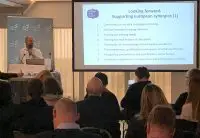During a webinar on 14 April 2021, professional bodies in the European audiovisual sector –FIM, FIA and UNI MEI for workers, CEPI and IFFPA for employers– presented the new interactive risk assessment tool (OIRA) dedicated to audiovisual production sites.
Run by UNI-MEI, the webinar essentially targeted representatives and professionals in the European audiovisual sector. Davide Gianluca Vaccaro, who coordinated the development of this tool for two years, presented a technical description. Roger Sutton contributed to this development work for FIM.
Like other tools in the OiRA family, this is available free of charge (in English) on the EU-OSHA website. It is comparable to tools already operating in the live entertainment sector and works from an office computer, tablet or smartphone. […]
Read full post








